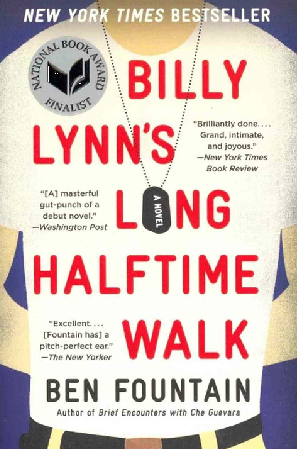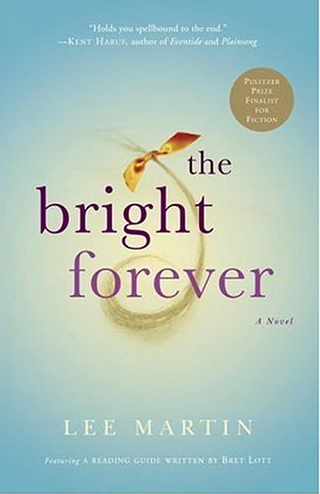Luckily Billy Lynn’s Long Halftime Walk was one of my readalong titles or I might have given up after fifty pages. I found it hard to get into but once I passed the fifty page mark, I was so engrossed, I could hardly put it down. What a terrific, poignant, witty, and sarcastic book.
The novel is set on the last days of Bravo company’s victory tour. Billy Lynn and his comrades are heroes. They survived a firefight in Iraq, during which they overthrew a group of insurgents. One of the Bravos died in the fight, another one came back disabled. Nonetheless, this “sacrifice” might have passed unnoticed if it hadn’t been filmed by an embedded journalist. As a reward they receive medals and are sent home on a propaganda tour.
This does it; they throw back their heads and roar. In a way it’s so easy, all he has to do is say what they want to hear and they’re happy, they love him, everybody gets along. Sometimes he has to remind himself there’s no dishonor in it. He hasn’t told any lies, he doesn’t exaggerate, yet so often he comes away from these encounters with the sleazy, gamey aftertaste of having lied.
The last day is meant not only as a special tribute but as a special treat. The Bravos assist and participate in a game of the Dallas Cowboys. They are allowed to go back stage and to talk to the players, their manager and their rich Texan supporters. At halftime, they are on the field, right next to the musical attraction – Destiny’s Child. And during every break, the footage of their fight is shown on a giant screen.
During this tour, and especially on this last day, people force themselves on the young men, telling them how much they admire them, asking them questions about the war “Are we winning?” – “Did you kill many?” – “It’s a god war we’re fighting, right?”
Billy who’s done the most heroic thing, is the 3rd person narrator of this story. Like Holden Caufield he is equally precocious and naïve and such a terrific character. One of the central plot lines is his falling in love with a cheerleader. While his testosterone-fuelled feelings might not be love, as he thinks, hers are even further from the feeling as all she wants is “a hero” – “a soldier”, as Destiny’s Child sing. She wants the idea of a man, not the man himself.
“Hi, you’ve reached Faison! I’m not able to take your call right now…”
It makes for an odd sensation, watching her real-time person in the middle distance while holding her disembodied voice to his ear. It puts a frame around the situation, gives it focus, perspective. It makes him aware of himself being aware of himself, and here is a mystery that seems worth thinking about, why this stacking of awareness should even matter. Ant the moment all he knows is that there’s structure in it, a pleasing sense of poise or mental ordering. A kind of knowledge, or maybe a bridge thereto–as if existence didn’t necessarily have to be a moron’s progress of lurching from one damn this to another? As if you might aspire to some sort of context in your life, a condition he associates with adultness. Then comes the beep, and he has to talk.
It’s a very difficult book to review as it’s not very plot-driven. It’s the exuberant style that’s important, the descriptions of the absurdities, the frenzy with wich football and war are celebrated by the very rich, as if both only served one purpose – to make them feel good about themselves and about being Americans.
Where else but America could football flourish, America with its millions of fertile acres of corn, soy, and wheat, its lakes of dairy, its year-round gushers of fruits and vegetables, and such meats, that extraordinary pipline of beef, poultry, seafood, and pork, feedlot gorged, vitamin enriched, and hypodermically immunized, humming factories of high-velocity protein production, all of which culminate after several generations of epic nutrition in this strain of industrial-sized humans? Only America could produce such giants.
No matter their age or station in life, Billy can’t help but regard his fellow Americans as children. They are bold and proud and certain in the way of clever children blessed with too much self-esteem, and no amount of lecturing will enlighten them as to the state of pure sin toward which war inclines. He pities them, scorns them, loves them, hates them, these children. These boys and girls. These toddlers, these infants. Americans are children who must go somewhere else to grow up, and sometimes die.
All the fakeness just rolls right off them, maybe because the nonstop sales job of American life has instilled in them exceptionally high thresholds for sham, puff, spin, bullshit, and outright lies, in other words for advertising in all its forms.
I don’t think I’ve ever come across a contemporary book that was so astute and harsh in its criticism of the negative aspects of American culture. It shows that most things are about money and consumption. And even when people pretend they care about something, they ultimately only care about what it can bring them.
Somewhere along the way America became a giant mall with a country attached.
The book is written in a frantic, quick-paced style, with long sentences and paragraphs that reminded me of listening to a frenzied sports commentator.
Billy tries to imagine the vast systems that support these athletes. They are among the best-cared for creatures in the history of the planet, beneficiaries of the best nutrition, the latest technologies, the finest medical care, they live at the very pinnacle of American innovation and abundance, which inspires an extraordinary thought – send them to fight the war! Send them just as they are this moment, well rested, suited up, psyched for brutal combat, send the entire NFL! Attack with all our bears and raiders, our ferocious redskins, our jets, eagles, falcons, chiefs, patriots, cowboys – how could a bunch of skinny hajjis in man-skits and sandals stand a chance against these all-Americans? Resistance is futile, oh Arab foes. Surrender now and save yourself a world of hurt, for our mighty football players cannot be stopped, they are so huge, so strong, so fearsomely ripped that mere bombs and bullets bounce off their bones of steel. Submit, lest our awesome NFL show you straight to the flaming gates of hell!
Sometimes, when I watch a war movie or read a book about war, I have my doubts. I wonder whether or not it’s really anti-war – as it should. I never wondered for one second while reading this book. It’s not only against war but against the justification, the fake heroism, the phony concern and gratefulness. But it’s kind to the soldiers. They are shown as victims who very often only joined up because they were too poor to do anything else.
I was thinking, if Salinger had written Catcher in the Rye right after 9/11, it might have been a lot like Billy Lynn. I loved the Catcher in the Rye. Needless to say, I loved Billy Lynn.
Since the writing is the most important thing in this book, I’ll leave you with some more quotes:
Don’t talk about shit you don’t know, Billy thinks, and therein lies the dynamic of all such encounters, the Bravos speak from the high ground of experience. They are authentic. They are the Real. They have dealt much death and received much death and smelled it and held it and slopped through it in their boots, had it spattered on their clothes and tasted it in their mouths. That is their advantage, and given the masculine standard America has set for itself it is interesting how few actually qualify. Why we fight, yo, who is this we? Here in the chicken-hawk nation of blowhards and bluffers, Bravo always has the ace of bloods up its sleeve.
Fear is the mother of all emotion. Before love, hate, spite, grief, rage, and all the rest, there was fear, and fear gave birth to them all.
It’s going to be a long, lonesome eleven months in Iraq, long and lonesome being the best-case scenario.
Everybody supports the troops,” Dime woofs, “support the troops, support the troops, hell yeah we’re so fucking PROUD of our troops, but when it comes to actual money? Like somebody might have to come out of pocket for the troops? Then all the sudden we’re on everybody’s tight-ass budget. Talk is cheap, I got that, but gimme a break. Talk is cheap but money screams, this is our country, guys. And I fear for it. I think we should all fear for it.
Other reviews
*******
Billy Lynn’s Long Halftime Walk is the fourth book in the Literature and War Readalong 2016. The next book is the German WWII novel All For Nothing – Alles umsonst by Walter Kempowski. Discussion starts on Friday 25 November, 2016. Further information on the Literature and War Readalong 2016, including the book blurbs can be found here.





